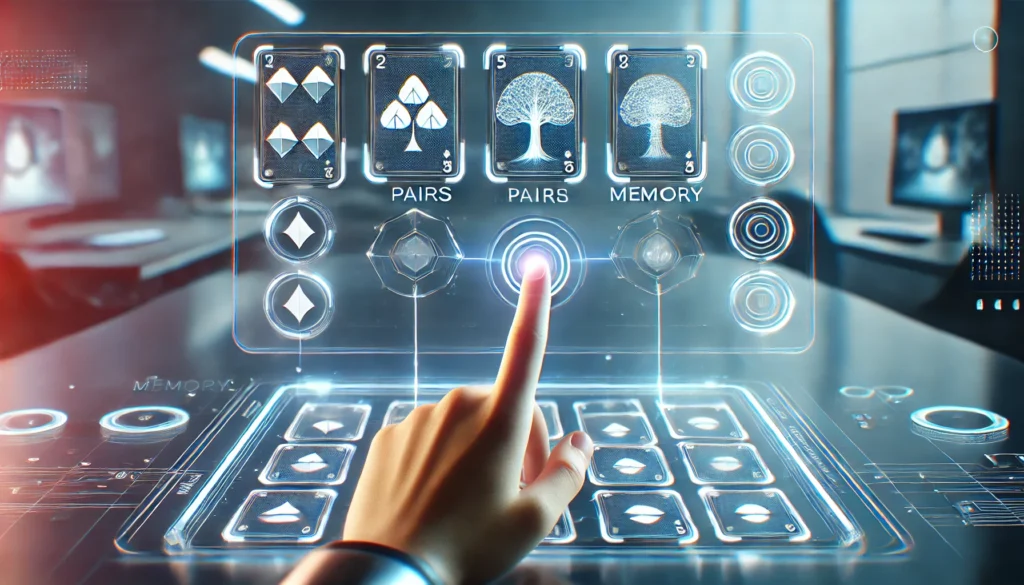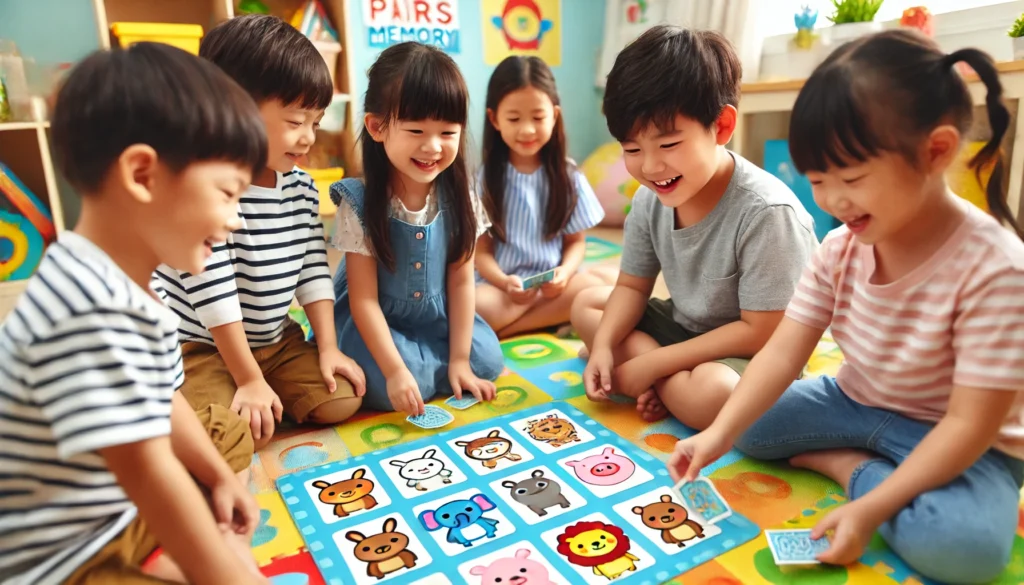In our rapidly evolving world, cognitive agility has become an essential asset. Whether you’re a health and wellness coach, science journalist, or biohacker, honing your cognitive skills can significantly impact your personal and professional life. One engaging and effective way to enhance these skills is through pairs memory games. These games, often referred to as matching pairs card games or concentration games, are more than just a pastime; they are a tool for mental sharpening and cognitive development.
You may also like: Boost Your Mind: Top Brain Games
The Science Behind Pairs Memory Games
Pairs memory games are simple in design but rich in cognitive benefits. These games require players to flip over cards, memorize their locations, and find matching pairs. This seemingly simple task engages several cognitive processes, including memory, attention, and pattern recognition.
Memory Enhancement
The primary cognitive benefit of pairs memory games is their ability to improve memory. By requiring players to remember the positions of various cards, these games exercise the brain’s short-term memory. This form of active recall has been shown to strengthen neural connections, leading to improved memory retention over time.
Moreover, consistent play can lead to enhancements in long-term memory, as the skills learned in short-term memory tasks can transfer over. For those interested in biohacking and cognitive optimization, regular engagement with these games can be a practical supplement to other brain-enhancing practices. Memory improvement isn’t just about recalling card positions; it’s about fostering a more robust mental database for everyday life.
Attention and Concentration
In addition to memory, pairs memory games demand a high level of concentration and attention. Players must focus on the task at hand, blocking out distractions to succeed. This type of sustained attention is a valuable skill in many aspects of life, from professional tasks to personal interactions.
Regularly playing these games helps individuals develop a sharper focus, enabling them to better handle multitasking and complex problem-solving scenarios. The skills honed during gameplay extend to real-world applications, such as improved work performance and enhanced listening skills in communication. By regularly playing these games, individuals can train their brains to maintain focus, a benefit that extends beyond the gaming session.
Pattern Recognition
Another cognitive skill enhanced by pairs memory games is pattern recognition. As players search for matching pairs, they must recognize and remember patterns. This skill is crucial in various real-world applications, from problem-solving to creative thinking.
Pattern recognition is not only about identifying similarities but also about understanding complex structures and systems in everyday life. Engaging in activities that promote pattern recognition can lead to improved cognitive flexibility, allowing individuals to approach challenges with a more innovative mindset. This ability to see connections and relationships can foster creativity and innovation in fields ranging from the arts to technology.
Decision Making and Problem Solving
Pairs memory games also play a role in enhancing decision-making and problem-solving skills. Each move in the game requires quick thinking and strategic planning. Players must decide which cards to flip based on limited information, honing their ability to make informed decisions under pressure.
This skill translates to real-world scenarios where quick, yet sound decisions are necessary, such as in business negotiations or emergency situations. The practice of weighing options and anticipating outcomes during gameplay can improve an individual’s capacity for critical thinking and strategic planning in everyday life.

Historical Context and Evolution
The concept of memory games dates back centuries, with roots in traditional card games and educational exercises. Originally designed as a way to entertain and educate children, these games have evolved significantly over time.
From Traditional to Digital
The transition from traditional card games to digital platforms has made pairs memory games more accessible than ever. Online concentration card games offer the same cognitive benefits as their physical counterparts, with added convenience. Players can engage in these games anytime, anywhere, making it easier to incorporate cognitive training into daily routines.
Digital versions have also introduced new elements, such as varying difficulty levels and themes, keeping the games fresh and engaging for players of all ages. The shift to digital has expanded the reach of these games, allowing players worldwide to connect and compete, further enhancing the social aspect of cognitive gaming.
Adaptation Across Cultures
Pairs memory games have been adapted across cultures, with variations reflecting local traditions and themes. This cultural adaptation enriches the gaming experience, offering players unique insights into different cognitive approaches and problem-solving techniques. Such diversity helps in fostering a global appreciation of cognitive training methodologies.
These cultural variations also provide an opportunity for players to learn about and appreciate different traditions and histories, enhancing their cultural literacy while engaging in cognitive training. This global perspective can be particularly beneficial for children, who gain exposure to diverse cultures through gameplay.
Current Trends in Cognitive Gaming
The rise of cognitive gaming as a wellness trend underscores the increasing awareness of brain health. Pairs memory games are at the forefront of this movement, offering a simple yet effective way to enhance cognitive skills. As more individuals seek to optimize their mental performance, the popularity of these games continues to grow.
Cognitive gaming is now being recognized as a legitimate form of mental exercise, with studies showing its effectiveness in reducing cognitive decline in older adults. This trend is supported by a growing body of research highlighting the benefits of regular mental challenges in promoting brain health and longevity.
Practical Applications and Benefits
The benefits of pairs memory games extend beyond cognitive enhancement. For health and wellness coaches, these games can serve as a valuable tool in client programs. They offer a fun and engaging way to promote brain health, fitting seamlessly into a holistic wellness approach.
For Health and Wellness Coaches
Wellness professionals can recommend pairs memory games to clients as part of a comprehensive cognitive training regimen. These games are not only enjoyable but also provide measurable cognitive benefits. By incorporating them into wellness plans, coaches can offer clients a practical way to enhance mental sharpness and focus.
These games can be tailored to individual client needs, making them versatile tools in addressing specific cognitive goals. Coaches can use them to track progress over time, providing clients with tangible evidence of cognitive improvement. This personalized approach makes cognitive training more engaging and effective.
For Science Journalists
Science journalists can leverage the popularity of pairs memory games to engage readers in discussions about brain health and cognitive science. By highlighting the scientific basis of these games, journalists can create compelling narratives that educate and inspire the public.
These stories can delve into the research behind cognitive gaming, offering readers insights into how these games affect brain function. Journalists can also explore the broader implications of cognitive enhancement, sparking conversations about the future of brain health and the role of technology in cognitive development.
For Educators and Parents
Educators and parents can use pairs memory games as educational tools to enhance learning and development in children. These games can help improve concentration and memory in young learners, making them an excellent supplement to traditional educational methods.
Incorporating these games into the classroom or home learning environment can make learning more interactive and enjoyable. By using pairs memory games as a teaching aid, educators can foster a love for learning and cognitive exploration in children from an early age.
For Biohackers
Biohackers seeking to optimize mental performance can incorporate pairs memory games into their routine as a form of cognitive exercise. These games complement other biohacking practices, such as nootropics and meditation, providing a holistic approach to brain health.
By integrating pairs memory games into their biohacking arsenal, individuals can create a balanced and comprehensive cognitive enhancement strategy. These games offer a low-risk, high-reward method for biohackers to experiment with cognitive improvements and track their progress over time.

Future Implications
The future of cognitive gaming holds exciting possibilities. As technology advances, pairs memory games are likely to become even more sophisticated, incorporating elements of artificial intelligence and virtual reality. These innovations could further enhance the cognitive benefits of these games, offering new ways to train and develop the brain.
Advancements in Technology
Emerging technologies promise to transform the landscape of cognitive gaming. Virtual reality could create immersive environments that challenge players’ cognitive abilities in novel ways. Meanwhile, artificial intelligence could personalize gaming experiences, tailoring challenges to individual skill levels for optimal cognitive training.
These technological advancements could lead to the development of new game formats that offer even greater cognitive benefits. As these technologies become more integrated into everyday life, the potential for cognitive gaming to impact brain health will continue to grow.
Implications for Brain Health
As our understanding of brain health continues to evolve, the role of cognitive games in promoting mental wellness will likely expand. Pairs memory games, with their proven benefits, are poised to remain a key component of cognitive training programs. Their accessibility and effectiveness make them an ideal tool for anyone looking to enhance their cognitive skills.
The continued research into cognitive games will provide further evidence of their effectiveness, encouraging broader adoption across various sectors. As more people recognize the importance of maintaining brain health, pairs memory games will play a vital role in supporting lifelong cognitive wellness.
Integration with Other Health Practices
The integration of pairs memory games with other health practices could lead to more comprehensive cognitive wellness programs. These games could be combined with physical exercise, nutrition, and mindfulness practices to create a holistic approach to brain health.
Such integrated programs could provide individuals with a well-rounded strategy for maintaining cognitive function and preventing decline. By combining cognitive games with other health practices, individuals can achieve a balanced approach to overall wellness and longevity.

Conclusion
Pairs memory games offer a unique and enjoyable way to boost cognitive skills. Whether you’re a health and wellness coach, a science journalist, or a biohacker, these games provide a practical approach to brain training. By engaging in pairs memory games, individuals can improve memory, attention, and pattern recognition, all while enjoying a fun and challenging activity. As technology and research continue to advance, the potential benefits of these games will only grow, making them an essential part of any cognitive enhancement strategy.
Incorporating pairs memory games into daily life can lead to lasting cognitive improvements and a greater understanding of brain health. As we continue to explore the potential of cognitive games, their role in shaping the future of brain wellness will become increasingly significant.
Further Reading:
Important Note: The information contained in this article is for general informational purposes only, and should not be construed as health or medical advice, nor is it intended to diagnose, prevent, treat, or cure any disease or health condition. Before embarking on any diet, fitness regimen, or program of nutritional supplementation, it is advisable to consult your healthcare professional in order to determine its safety and probable efficacy in terms of your individual state of health.
Regarding Nutritional Supplements Or Other Non-Prescription Health Products: If any nutritional supplements or other non-prescription health products are mentioned in the foregoing article, any claims or statements made about them have not been evaluated by the U.S. Food and Drug Administration, and such nutritional supplements or other health products are not intended to diagnose, treat, cure, or prevent any disease.


